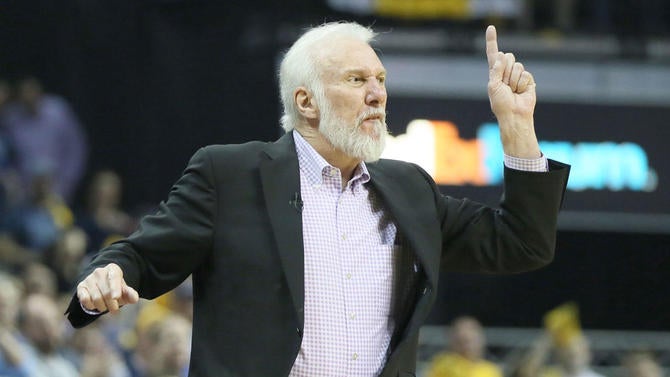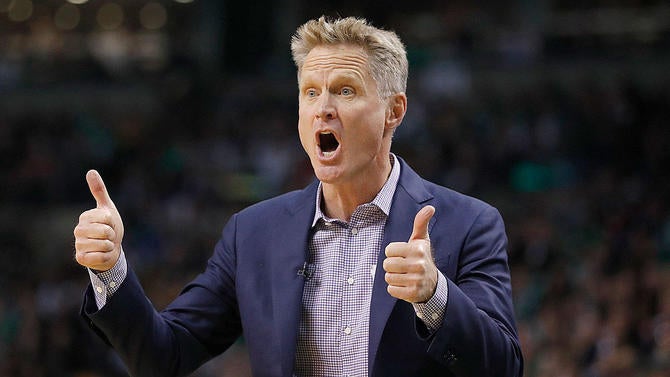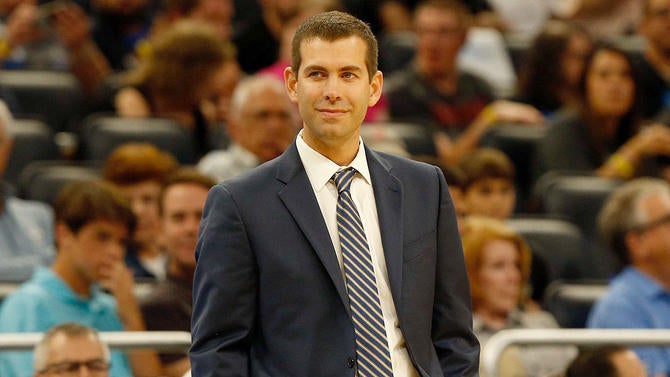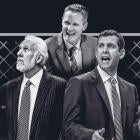The NBA is a star-driven league, so much so that coaching typically gets tossed aside in most discussions. That is to say, most discussions unless there is a narrative surrounding a coach. When a coach gets a reputation as special, it can actually transcend reality in some regards. Gregg Popovich has actually been out-coached in a series. Brad Stevens has won two playoff series, total, and in both series was in serious danger of losing. Steve Kerr has routinely made rotation decisions which baffle both fans and media.
No one's perfect, and more times than not, we ascribe great coaching attributes to teams of great talent. The reverse is true as well, though. Erik Spoelstra never truly got the credit he deserved for figuring out how to coach a team with as much star talent (and ego) as the Triad Heat had, or for getting ahead of the small-ball craze with how they used LeBron James at power forward and Chris Bosh at center. Scott Brooks is routinely discussed as sub-par coach, despite making three Western Conference finals in four seasons with OKC and bringing the Wizards from a lottery squad to a second-round force that forced the 1-seed to a Game 7.
Perception isn't really reality when it comes to NBA coaching, but Popovich, Kerr and Stevens really have earned their reputations for being the toppermost of the toppermost tier when it comes to their profession.
Arguing between the three for best is futile. Popovich clearly is regarded as the best coach in the game., He has a fair claim to being not just the best coach in NBA history over Red Auerbach and Phil Jackson, but the best coach in all of sports history given his championships but the sustained success over such a long period of modern history when competition was at its strongest. Kerr has two titles and is the coaching mind that helped take the Warriors from a second-round also-ran to three of the best teams we've ever seen, and Stevens is constantly lauded by executives, fellow coaches and informed media.
Without ranking them, here's a closer look at the three consensus best minds on NBA sidelines right now.

Gregg Popovich (Spurs)
- Regular-season record: 1169-515
- Postseason record: 166-106
It sometimes feels like we've just ran out of things to say about Popovich. How do you adequately put into words the guy's dominance in his field? The Spurs have won at a 50-win pace every single season since 1999. They've won at a 55-win pace in 16 the past 19 seasons, on pace for the 17th in the past 20.
Since 1999, the Lakers, Warriors and Celtics have nine combined seasons at a 60-win pace or higher.
San Antonio has eight.
Those are results, though. The process is what matters with Popovich, and it's been flawless. The Spurs make a mockery of injury report reactions. They win when they rest everyone. The Spurs, more than any other team, challenge the notion that a team is reflected in the value of any one individual. Their success without key players is consistent and yet it goes overlooked, chalked to up some mysticism. In reality, it's evidence of their consistent and disciplined approach to every game. It's not just the regular season, either. The Spurs lost Tony Parker, and then Kawhi Leonard in their second-round series against the Rockets ... and still won.
Popovich teams have also shown a remarkably diverse identity. His teams haven't changed dramatically but instead evolved over time, from a grind-it-out defensive team in the early and mid-00's, to the supreme ball movement of the "Beautiful Game" Spurs of 2012-2015. Now, the Spurs have pivoted again, building around LaMarcus Aldridge and the defensive dominance of Leonard. It's not that the Spurs weren't good in those years where the ball was zipping with Parker at the helm, it's that the pace and style of play was different. The 2014 Spurs were third in defensive rating and 10th in pace. This year, they are third in defensive rating and 29th in pace.
It's why talk of the Spurs' "system" is, in some ways, misguided. The Spurs' system involves getting players who will make the right play if taught, teaching them to make that right play and developing their skills to help in the ways they can. The Spurs are never an unhappy team, but neither are they the joy factory Golden State is. They're closest to a group of craftsmen who come in for a job, enjoy the work and one another, but aren't there to flaunt their success. Stonecutters, wood workers, artisans who take their craft seriously and with pride, but also return to their families.
Popovich's droll, incessant withering of the media is neither performance art nor a critical statement. In fact, notably in last year's playoffs amid a political environment that increasingly sees the media as a corrupt enemy, Popovich showed uncommon patience and politeness during San Antonio's playoff run. It's simply all part of the package of never spending time on that which is unworthy of spending time on.
The Spurs' precision and design are impressive and at times, ingenious. Their discipline and consistency are the model by which every team should be measured. Popovich has made mistakes; Scott Brooks in 2012, Doc Rivers in 2015, Billy Donovan in 2016, these are just recent examples of coaches who have had more adjustments in their bag than Popovich. The word "adjustments" in playoff series is often overused, but Popovich, by his own admission, does tend to only have so many things he's willing to turn to. He's not constantly coming up with wild things which catch the opponent off guard. He plays his team the way they play that makes them the best they can be, he tweaks rotations and cross-matches to his advantage, and when those cards are played, he lets the chips fall where they may.
We'll never really know who Popovich is. There will be no memoir, no book, no deep interview when he's done coaching. But through the simple fact that he has done this as long as he has, we've learned a lot about his team, and what makes them great. The Spurs do what they do without they mysticism of Phil Jackson, the casual joy of Kerr. If anything, Popovich's closest coaching comparison is really Red Auerbach, who formed a partnership with Bill Russell as Popovich once did with Duncan. Both men have used the wisdom of perspective to keep their teams at once focused and grounded, and neither had time for nonsense.
A great many men in sports have wanted their legacy to be that of "a winner." Popovich's is best summarized as a man who coached the NBA the way that everyone hopes their coach will. The "right way" is a complicated term, but in time, it's been shown in its truest form to be synonymous with "the Spurs way."

Steve Kerr (Warriors)
- Regular-season record: 228-45
- Postseason record: 47-15
For a man with chronic back pain who's endured a life of tragedy ... Steve Kerr's a remarkably jolly dude.
If you want to talk about the Golden State Warriors and the incredible transformation we've witnessed them take since Kerr took over, you can talk about shooting. Or defense. Or just, generally Stephen Curry. I tend to think of joy, though.
This is not a secret. It's been written about, ad nauseam, but it's also key to understanding the difference between the Warriors and literally everybody else. Curry's bonkers shooting from range? He was always an incredible shooter, but Kerr removed any convention of shot selection in favor of freeing him up. The Warriors' ball movement? Kerr instilled a system that shared the ball so that every player felt included, proof that it's not about shot volume, but involvement that keeps players happy. And that engagement helped fuel the Warriors' consistent commitment to defense, especially in transition. It all feeds together.
Kerr's accomplishments are obvious, but they still get lost with how good this team is, and how spectacular its talent is. No one has ever coached a team to 73 wins. No one has ever finished first in defensive rating and first in pace, a combination previously thought impossible due to the demands on players to limit transition plays. No one has ever reached the Finals unbeaten as Golden State did last season. They own the second-best offensive rating in history with last season's team. Oh, and two titles.
It's popular to debate the key to the Warriors without aligning it to history. To say it was Curry ignores that Curry was already regarded as the best shooter in the league before Kerr arrived. After Kerr's first year, and certainly after the 2016 73-win season, he became the best shooter in history. To say it was the flexibility and malleability of their talent in terms of omni-positionality ignores how Kerr fully embraced their hyper-switching scheme and used the small-ball "Death Lineup" to peak effectiveness. Yes, it took Curry's hyperspacing and Draymond Green's liquid positionality to unlock them, along with Klay Thompson's constant threat and Andre Iguodala's superior mindfulness. But all these things were present before Kerr. After Kerr, everything changed.
This doesn't mean Curry wouldn't be an MVP candidate without Kerr, or that Green wouldn't be an annual Defensive Player of the Year candidate. It does mean that Kerr unlocked something which wasn't present when the Warriors were bowing out to the Clippers in the first round. No one element of this once-in-a-lifetime combination of players -- Kevin Durant included -- is solely responsible, nor are any of the key personnel just along for the ride.
In the playoffs, if Popovich has a limited menu of adjustments he is quick to implement, Kerr is, ironically, the hare in the race. He will let the Warriors settle in, and only when they are truly threatened do those adjustments come. The Grizzlies smacked Golden State in the face in 2015, until Game 4 when Golden State simply stopped guarding Tony Allen and everything Memphis built came undone. Oklahoma City shoved the Warriors to the brink, until, well, Thompson bailed them out in Game 6, but also Kerr threw out subtle combos to get the Warriors back on their feet.
Kerr has a bad habit of going to the wrong bigs at weird moments. His infatuation with Festus Ezeli and Anderson Varejao in 2016 cost them dearly vs. the Cavs. He tends to play the bigs more than fans feel he should, mostly because he understands the physical toll that the smaller lineups place on players. And when things spiraled in that fateful 3-1 collapse, Kerr was unable to reign in the one and only limitation to this team's greatness, it's penchant for unfathomable sloppiness.
Still, Kerr has lost one playoff series in three seasons, with a net rating of plus-8.3, an absurd number. Kerr routinely is belittled as if having talent is something to be held against him, but this three-year run matches up with any in NBA history, and as we're all aware, the Warriors are just getting started.

Brad Stevens (Celtics)
- Regular-season record: 189-167
- Postseason record: 11-17
This used to be Rick Carlisle. Given Carlisle's long-standing success, NBA championship and pretty good 58-62 record in the playoffs, it might still should be. Stevens is still nascent, still learning. However, the hype, as they say is real, and there are good reasons for it. I wrestle with whether a coach this young and inexperienced, with so few actual victories, should be considered one of the best three coaches in the NBA.
But he is, not just by fans and an adamant media in New England, but by his peers who laud him at every turn, and players who speak of what he's done for them.
Stevens has no championships. No Finals appearances. As stated above, he's won a grand total of two playoff series, one a playoff series vs. the Bulls where he was shockingly out-coached until Rajon Rondo's injury, the second a Game-7 grind-out fueled to victory by a career night from Kelly Olynyk. You can't really argue that taken on accomplishment, Stevens' career has been nothing more than "fine."
However, just as Kerr is punished by the public for being gifted with transcendent talent, Stevens is lauded for his ability to win with what's seen as sub-par talent. It's probably unfair to the work put in by guys like Isaiah Thomas, Marcus Smart, Jae Crowder and Avery Bradley that the Celtics last season were seen as the product of a coach making a team better than they were, or to this season's players that the Celtics' unconventional and surprising success has been reached despite the opening night injury to Gordon Hayward thanks to Stevens' "genius."
Still, like with Kerr, Stevens plays a real part in all this. More than anything, Stevens does what so many coaches refuse to: coach to his players' strengths. Stevens could have rolled out a fast-paced, offensive approach looking to use their young legs and athleticism. Instead, Stevens and his staff saw the team's length and realized they could build this slow-it-down, grind-it-out team that could beat teams with the same formula the old, grizzled 2010-2012 Celtics team won with. Those squads would smother you defensively, clanging shots off the rim, keeping it low scoring, until the final five minutes, when Paul Pierce and Ray Allen's precision could take over and the Celtics would simply out-execute you.
Boston is 8-4 this season when its offensive rating is under 100, which in today's terms, means the Celtics beat the pants off you despite their offense being hot garbage.
Stevens is pulling this off by making Al Horford the conductor, and empowering Jayson Tatum in a way you would never see from most head coaches with a rookie. Stevens isn't punishing or holding the young players like Tatum, Jaylen Brown and Terry Rozier on a leash. He's trusting them, putting them in the best positions and building a team around what they're good at.
The Celtics also take advantage of opportunities. In the past three seasons, Boston is 24-16 on back-to-backs. Those are schedule losses that Stevens helps turn into wins. Things like that contribute to a formula that effectively helps make the Celtics better than expected. They're four wins better than their Pythagorean expectation last season, they're two wins better already this season. Stevens truly does get more out of his teams than the sum of their parts.
And still, he's learning. He made the conference finals in his fifth year coaching. He has a core that's both good and young, with All-Star talent reinforced by developing studs. The Celtics don't beat themselves and you can never point to a series and say that Stevens had the better team when they lost. The expectations for Stevens are for future Coach of the Year awards -- he's the runaway favorite right now -- and titles. Stevens hasn't had to earn his reputation like some coaches, but it's also impossible to deny that he's earned his place at the top of any coaching list ... and not just because his after-time-out plays are considered genius.


















